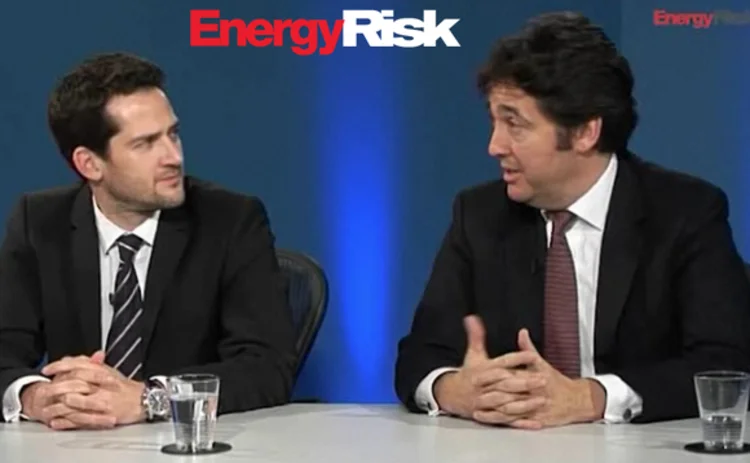
Energy Risk presents the Future of Carbon Trading Round Table
With carbon prices plunging both the Europe and the US as the fragile global economy takes place Energy Risk is speaking to key players within the industry regarding the future of the carbon markets and what developments are foreseen in the future

Topics for discussion include:
- Is it helpful to the ETS that individual EU countries enact their own carbon reduction measures beyond the scheme’s scope?
- What is going to happen to the EU ETS post 2020?
- To what extent will the aviation sector take part in emissions trading?
- Will there be a change in the level of the emissions cap?
- What measures can/will be taken which would lead to a carbon price that incentivises real emissions reductions rather than just the purchase of cheap credits.
- With Canada pulling out of the Kyoto protocol on climate change do you see further countries following suit, what is the future for other participants?
- How will the power sector adjust when it has to purchase all allowances from auctions?
- Is there a price where carbon trading becomes merely a compliance activity for polluters?
- Are you optimistic about the future of the carbon market?
Click here to register to view the 'Energy Risk presents the Future of Carbon Trading Round Table'
Speakers include:
- Mark Owen-Lloyd, Energy Trader, CF PARTNERS
- Benedikt von Butler, Director for Environmental Products, CITIGROUP GLOBAL MARKETS LIMITED
Click here to view further information on our speakers.
In association with CF Partners
Only users who have a paid subscription or are part of a corporate subscription are able to print or copy content.
To access these options, along with all other subscription benefits, please contact info@risk.net or view our subscription options here: http://subscriptions.risk.net/subscribe
You are currently unable to print this content. Please contact info@risk.net to find out more.
You are currently unable to copy this content. Please contact info@risk.net to find out more.
Copyright Infopro Digital Limited. All rights reserved.
As outlined in our terms and conditions, https://www.infopro-digital.com/terms-and-conditions/subscriptions/ (point 2.4), printing is limited to a single copy.
If you would like to purchase additional rights please email info@risk.net
Copyright Infopro Digital Limited. All rights reserved.
You may share this content using our article tools. As outlined in our terms and conditions, https://www.infopro-digital.com/terms-and-conditions/subscriptions/ (clause 2.4), an Authorised User may only make one copy of the materials for their own personal use. You must also comply with the restrictions in clause 2.5.
If you would like to purchase additional rights please email info@risk.net
More on Risk management
Op risk data: FIS pays the price for Worldpay synergy slip-up
Also: Liberty Mutual rings up record age bias case; Nationwide’s fraud failings. Data by ORX News
Banks hold 73% of liquidity buffer in cash and Level 1 assets, on average
Largest lenders hold highest share of central bank reserves in buffer, latest analysis shows
EBA supports global op risk taxonomy, but it won’t happen soon
New EU framework designed to ease adoption by banks; other jurisdictions have different priorities
Allocating financing costs: centralised vs decentralised treasury
Centralisation can boost efficiency when coupled with an effective pricing and attribution framework
EVE and NII dominate IRRBB limit-setting
ALM Benchmarking study finds majority of banks relying on hard risk limits, and a minority supplementing with early-warning indicators
Banks split over AI risk management
Model teams hold the reins, but some argue AI is an enterprise risk
Collateral velocity is disappearing behind a digital curtain
Dealers may welcome digital-era rewiring to free up collateral movement, but tokenisation will obscure metrics
New EBA taxonomy could help integrate emerging op risks
Extra loss flags will allow banks to track transversal risks like geopolitics and AI, say experts








